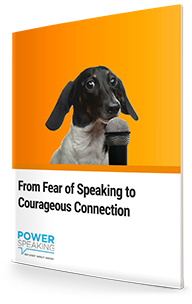
by Carrie Beckstrom, Chief Executive Officer, PowerSpeaking, Inc.
Last year I had the privilege of introducing a number of speakers at the Women in Tech World Series conferences. All the speakers were powerful. When it comes to courage, however, there was one woman who stood out above all the rest.
She and I sat next to each other as her time to speak neared. She was so visibly nervous, I could almost feel her shaking.
Her topic was a deeply personal one about a technical career fraught with obstacles, failures, but ultimately, success. Initially, her stance was tight and uncomfortable, her voice quaked, and she didn’t make easy eye contact with the audience. Eventually she loosened up a bit, but her body language remained small and close to her body.
Being in the business of speaking and presentation skills training, you’d think I (and even the audience) would be uncomfortable and disappointed with her “performance.” Quite the opposite. Within one minute of her talk, everyone was on the edge of their seat, hanging on her every word until the end.
What everyone in the auditorium witnessed that day was the incredible power of authenticity, and the courage to speak in spite of fear.
You see, public speaking isn’t about being perfect. And it’s not about “overcoming” fear. Rather, it’s about being willing to experience discomfort in service of your audience and what you have to share.
Pushing through your fear of public speaking can elevate many aspects of your life—from advancing your career to growing your business and forming deeper, more productive relationships.
So, let’s get started.

Don't have time to read the whole guide right now?
Let us help you succeed with our guide From Fear of Speaking to Courageous Connection. Get the PDF version that you can save to your desktop and read when it's convenient for you.
(Direct Download, No Form Required):

Content:
Transform Your Fear and Reap the Benefits
• Benefits to Your Organization
Why Do We Fear Public Speaking?
Four Paths to Courageous Speaking
Transform Your Fear and Reap the Benefits
Let's take a look at the benefits of improving your public speaking and communication skills in three areas: your career, your impact on the organization, and your community involvement .
Benefits to Your Career
Avoiding public speaking can, for many, become a roadblock to their career advancement.
Recent research has shown that business leaders see communication skills, including public speaking and presenting, to be among the most important skill sets employees can have to succeed, and to move the organization forward.
Regardless of where you are in your career, improving your communication skills will help you reach your goals. As a matter of fact, finding the confidence and ease to speak in public and communicate well with others becomes a personal strength, if you work on it.
Benefits to Your Organization
Your ability to speak and present well will add to your credibility—and, if you're also authentic, will build trust. That means the company benefits as you successfully work with others to drive new ideas and critical projects forward.
Whether or not you aspire to move into management, remember that “leadership” is marked by the ability to accomplish tasks while inspiring others to do the same. Your company can only benefit from people who employ excellent communication to lead the business forward.
Benefits to Your Community
The benefits of public speaking are endless when it comes to community.
Through public speaking, you and your community members can gain exposure and build the strong connections it takes to inspire change and get things done—whether it’s at your children’s school, for a local development initiative, or for a global action cause.
So, with all of that to gain . . .
Why Do We Fear Public Speaking?
In a fascinating Harvard Business Review article, “To Overcome Your Fear of Public Speaking, Stop Thinking About Yourself,” author Sarah Gershman explains that people’s fear of being in the spotlight is connected to an ancient reality:
“... we need to go way back to prehistoric times, when humans perceived eyes watching us as an existential threat. Those eyes were likely predators. People were literally terrified of being eaten alive. In response to that prehistoric reality, the amygdala, the part of our brain that helps us respond to danger, kicked into full gear. And when our fight-or-flight response gets triggered, we understandably feel intense stress and anxiety. What does this have to do with public speaking? Turns out, everything.
“Here’s the bad news: Our brains have transferred that ancient fear of being watched onto public speaking. In other words, public-speaking anxiety is in our DNA.”
Heavy stuff! The good news is, you’re not alone in your fear of public speaking or presenting, and as Gersham points out,
“Fortunately, there is a solution: human generosity. The key to calming the amygdala and disarming our organic panic button is to turn the focus away from ourselves—away from whether we will mess up or whether the audience will like us—and toward helping the audience.”
And that leads us to the first of four powerful techniques you can use to ease your anxiety.
Four Strategies to Transform Fear Into Confidence
Serve Your Audience
I read a headline recently that echoes Gershman's insight: “Learn to be a more generous speaker.”
If you regularly struggle with a fear of public speaking and presenting, this is a priceless piece of wisdom.
In a recent PowerSpeaking Live!, I talked with panelists Liane Davey, author and keynote speaker, and Mitesh Kapadia, PowerSpeaking Master Facilitator and Coach, about the power of shifting to a service mindset to alleviate performance anxiety and improve your overall effectiveness.
Here’s our key advice:
🔹 Don’t fear your fear! A little anxiety is normal if you care about your message and your audience
🔹 Shift from a mindset that says, “Here’s how I can be perfect today” to “Here’s how I can serve my audience today”
🔹 Calm your nerves by learning to become a generous speaker who is willing to engage and connect with the audience
Your audience is there to learn something from you, and they want you to succeed. So, focus on them, not you.
Prepare, Prepare, Prepare
Of course, doing the necessary research, fact-checking, and content organization are important preparation steps for your talk. But at the same time—and maybe even sooner—you should analyze your audience.
Here’s a brief dive into how best to get to know your audience ahead of time, in order to craft your content so it serves them best. The clip is from a webinar hosted by Sarah Palmer, PowerSpeaking Master Facilitator and Coach.
BONUS: Here’s a downloadable copy of the “Audience Analysis Content” checklist Sarah references in the video.
Once you’ve created your presentation, it’s time to . . .
Practice, Practice, Practice
If you want to give yourself the best chance of success when presenting, practice your talk until you know it backward and forward.
Not with the aim of delivering an overly scripted, rigid presentation; but rather, to build a level of confidence that allows you to genuinely connect with your audience and to flex in the moment.
Practice multiple times, testing out different ways to say things. Practice with any slides, media, or props you intend to use. Practice in front of someone you admire—maybe even intimidates you a little—to get the most constructive feedback.
Then, record your talk and watch it to see where else you can improve.
Unfortunately, many presenters think practice means simply reading and rereading a script. In a recent Live! panel discussion, PowerSpeaking Master Facilitator and Coach Janell Payne and I talked about the importance of experiencing your talk off the page.
We both agree that:
🔹 If you want to give the best talk possible, there’s no substitute for practicing out loud
🔹 The physical experience of this kind of practice is THE BEST way to really master your content
🔹 Once you’ve nailed down your message and content, you can be confident in the moment and prepared to pivot when you’re “on stage”
Finally, there are tried-and-true relaxation techniques you can use before you step onto the stage . . .
Ease Your Fear With These Exercises
"Feelings come and go like clouds in a windy sky. Conscious breathing is my anchor." –Thich Nhat Hang, Zen Master, author, poet, and peace activist
Many of us forget the almost magical power of deep, slow, mindful breathing. Instead, we often live unconsciously with the effects of tight, shallow breaths.
The Harvard Medical School explains the impacts of shallow breathing patterns and the benefits of improved ones:
“Shallow breathing limits the diaphragm’s range of motion. The lowest part of the lungs doesn’t get a full share of oxygenated air. That can make you feel short of breath and anxious. Deep abdominal breathing encourages full oxygen exchange—the beneficial trade of incoming oxygen for outgoing carbon dioxide. Not surprisingly, it can slow the heartbeat and lower or stabilize blood pressure.”
The ability to harness your breath is one of the most important things to master if you want to become a confident speaker.
A basic control technique to induce relaxation, focus, clarity, and calm is known as "box breathing":
- Exhale to a count of four
- Hold your lungs empty for a four-count
- Inhale to a count of four
- Hold the air in your lungs for a count of four
- Exhale and begin the pattern again
Additionally, we suggest these exercises:
Visualize success Practice “seeing” the setting, the audience, and yourself delivering a wildly successful talk.
Use expansive gestures There is strong agreement that expansive gestures can help you feel more confident.
Focus on facts vs. fears Rather than focusing on your nerves, dry mouth, etc., focus on the fact that you know your stuff, you were invited to the stage for a reason, and people want you to succeed.
Final thoughts . . .
There’s a mantra I’ve been repeating to myself over and over as I train for my first marathon in five years: “Get comfortable being uncomfortable.” Why? Because while there’s no denying it's tough at times, the rewards are worth it.
The same goes for having the courage to step outside your comfort zone and speak, whether it be on a stage or in a meeting. The results are worth it. People need to hear what you have to say, and you can’t continue to grow without taking risks.
So, get comfortable being uncomfortable. As our founder Rick Gilbert likes to say "It’s not about perfection. Let 'er rip!"






.png)


